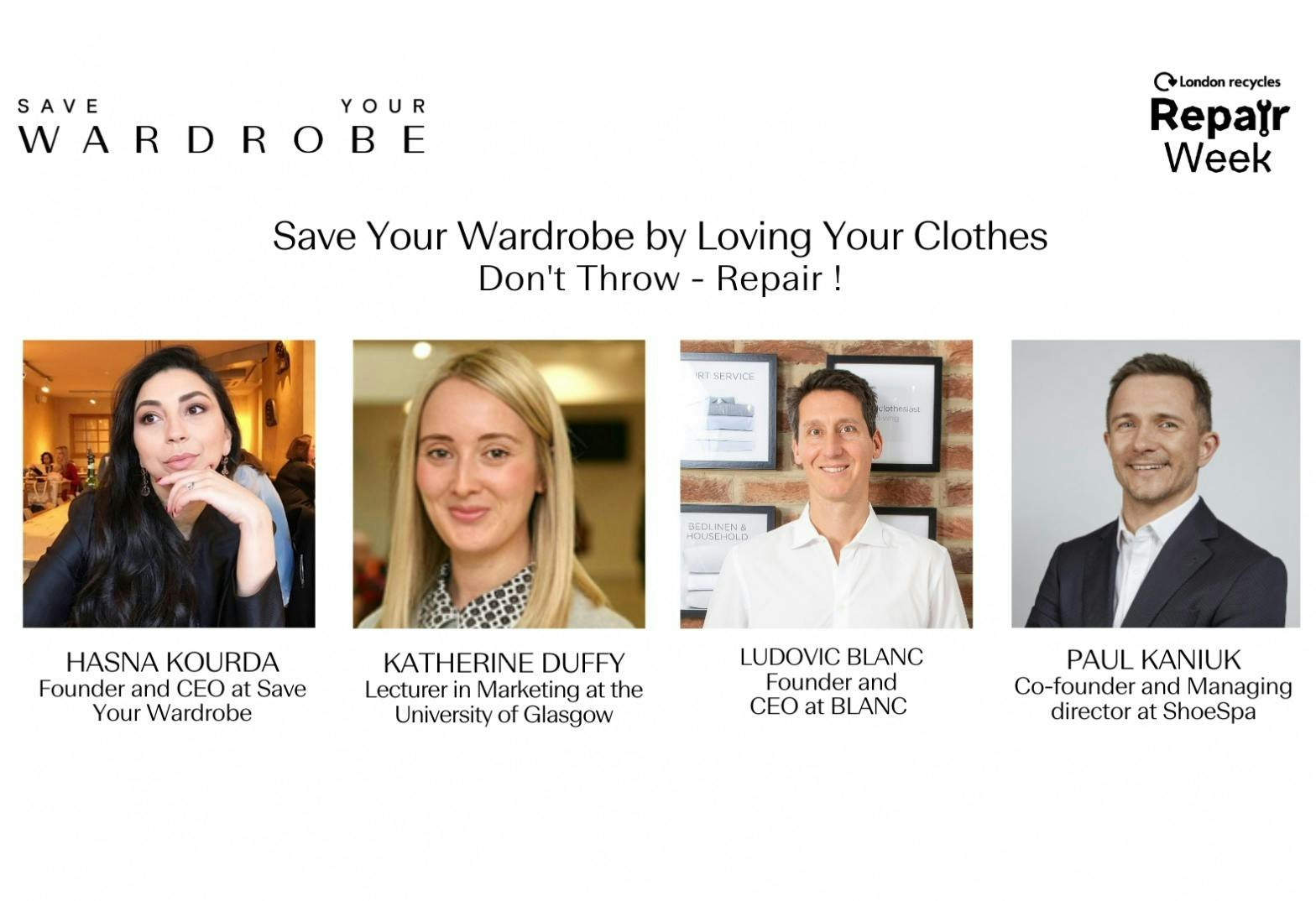
Save Your Wardrobe by Loving Your Clothes
For this first everLondon Repair Weekthat took place from the 12th to the 17th of October, Save Your Wardrobe held a panel discussion to discuss the future of sustainable fashion and how digitalisation is easing access to repair services.
For this panel, Hasna, our Founder and CEO has been joined by industry professionals and experts. Dr Katherine Duffy is a Lecturer in Marketing at the Adam Smith Business School, University of Glasgow; Ludovic Blanc the Founder and CEO of BLANC and Paul Kaniuk the Co-Founder and Managing Director of ShoeSpa and BagSpa.
London Recycles commissioned new research ahead of the capital’s first ever Repair Week that has revealed that Londoners are eager to repair and re-use things. 72% of Londoners feel they are losing repair skills, while 44% of Londoners don’t know where to go to get their items repaired and over two thirds would repair more items if they knew how. Similar findings were revealed through the polls conducted during the panel.
IMPACT OF COVID-19 ON TRADITIONAL CONSUMPTION AND SUSTAINABLE BEHAVIOURS
The panelists exchanged the ways in which the Covid Recession has accelerated Sustainable practices. They also addressed the fact that current Pandemic climate and desire for contactless actions has acted as a catalyst for digital transformation, before delving into the concept of responsible citizenship that is slowly but surely overtaking traditional capitalist consumerism.
The Covid 19 crisis in a Climate Emergency context has been a trigger for systemic change and pro-activism. Repairing has become a civic action and more and more younger generations are up-skilling themselves and learning ways to make new with old. This period is an enforced pause for consumers, giving the time and space to reflect on what they own and how they make purchases. The huge challenges faced by individuals this year created a restorative opportunity to reconnect with nature and has strongly impacted on people’s sustainability aspirations. Research shows that this year so far, people reconnected with what they own, by “Reshopping their wardrobes”, they have attempted to seek more value from items they already own and are becoming more willing to invest in quality garments that will last longer.
As people can no longer go in store, habits have changed and both Blanc and ShoeSpa have testified to an increase in service requests made digitally. Digitalisation has proved itself as an enabler for businesses to maintain some activity.
DIGITAL ACCELERATION
The pandemic has triggered the faster acceleration of digital transformation; for aftercare services, this means adopting new technologies and transforming the user experience. Paul from ShoeSpa noted how technology does not only make everything more convenient, but also it increases awareness and provides tools for communication and education.
Ludovic from Blanc makes a metaphorical comparison to the ‘L’effet Colibri’ which refers to a little bird trying to extinguish a fire by dropping little drops of water in intervals. When faced with backlash from observers who state that the bird’s efforts are useless, the bird responds with ‘I am doing my bit, one drop at a time, what are you doing?’ This ties in nicely with the idea of sustainable living, as we cannot change the world overnight; rather, it is about the continuous small actions that add up. Ludovic elucidates how technology is thus an enabler through which Blanc can offer more services and educate people to make these small everyday changes.
Katherine’s in depth studies have highlighted a key challenge with consumers’ relationships with their wardrobes. Due to lack of awareness, users are not able to make meaningful changes to their behaviour. Research showed that digital intervention such as the SYW app was a way for consumers to gain an understanding of what they already owned. This solution also made users feel more empowered and have more agency over making decisions. Some people felt particularly anxious over their wardrobes and therefore, digitalisation presents an opportunity to help people to make more sustainable, informed choices. It eases the access to more services makes the whole experience much easier.
RESPONSIBLE CITIZENSHIP
The idea of responsible citizenship is especially relevant at this time of climate emergency, proven by an increasing discourse from the media highlighting issues with the traditional fashion industry, prompting mainstream consumers to rethink their choices. However, Kat mentions how we cannot point blame at consumers as they are overstretched and have limited capacity for action. Therefore by providing consumers with a tech solution, it makes it as easy as possible for people to live their values and sustainability goals. It allows users to leverage the wardrobe they already own: buy less, buy better and maintain it, a form of individual activism that we can all indulge in.





